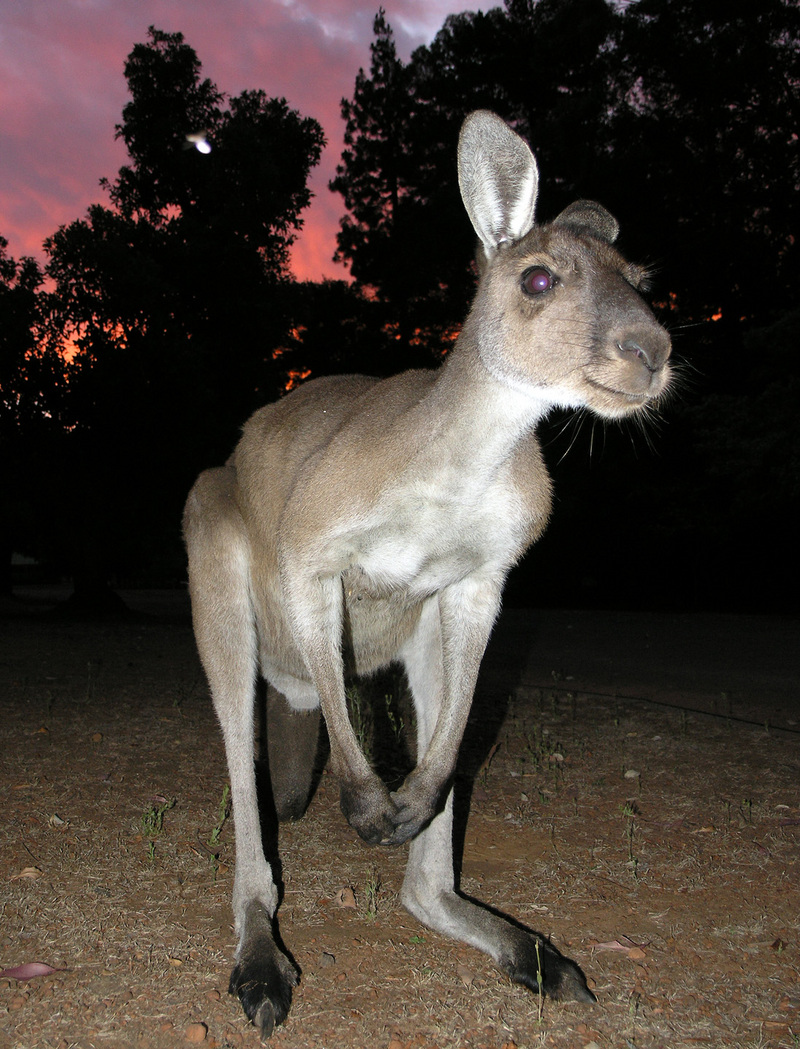Western Grey Kangaroo
From Wikipedia, the free encyclopedia
[Photo] Wild Western Grey at sunset. Taken at Donnelly Mills, Western Australia. Photo by SeanMack.
The Western Grey Kangaroo (Macropus fuliginosis or alternately Macropus fuliginosus) is a large and very common macropod, found across almost the entire southern part of Australia, from just south of Shark Bay to coastal South Australia, western Victoria, and the entire Murray-Darling Basin in New South Wales and Queensland.
Description
Western Grey Kangaroo is one of the largest kangaroos, it weighs 15-54 kg and its length is 0.9-1.4m with a 75-100 cm tail. It exhibits sexual dimorphism with the male up to twice the size of female. It has thick, coarse fur with color ranging from pale greyish-brown to chocolate-brown; its throat, chest and belly have a paler color. It feeds at night, mainly on grasses but also on leafy shrubs and low trees. It has a nickname Stinker because mature males have a distinctive curry-like odour.
The kangaroo lives in groups of up to 15. The males compete for females during the breeding season. During these "boxing" contests, they would lock arms and try to push each other over. Usually, only the dominant male in the group mates. The gestation period is 30-31 days, after which, the baby Joey attaches to the teat in the pouch for 130-150 days.
Classification
Long known to the Aboriginal people of Australia, for Europeans, the Western Grey was the centre of a great deal of sometimes comical taxonomic confusion for almost 200 years. It was first noted by European settlers when the great explorer Matthew Flinders landed on Kangaroo Island in 1802. Flinders shot several for food but assumed that they were Eastern Grey Kangaroos. In 1803 French explorers captured several Kangaroo Island Western Greys and shipped them home to Paris, where they lived in the zoological gardens for some years. Eventually, researchers at the Paris Museum of Natural History recognised that these animals were indeed different and formally described the species as Macropus fuliginosus in 1817. Unfortunately, for reasons that remain unclear, it was described as native to Tasmania.
There the matter rested for over 100 years, and it was not until 1917 that researchers realised that the "Forester Kangaroo" of Tasmania was in fact Macropus giganteus, the same Eastern Grey Kangaroo that was, and still is, widespread in the more fertile south-eastern part of the mainland. By 1971, it was understood that the Kangaroo Island species was the same as the kangaroos of southern Western Australia, and that this population exended through much of the eastern part of the continent as well. For a time, three subspecies were described, two on the mainland and one on Kangaroo Island. Finally, by the early 1990s, the current understanding emerged.
Subspecies
There are two subspecies of the Western Grey: Macropus fuliginosus fuliginosus of Kangaroo Island, and Macropus fuliginosus melanops, which has a range of different forms that intergrade clinally from west to east.
The Western Grey is not found in the tropical north or the fertile south-east of Australia, and the Eastern Grey does not extend beyond the NSW-South Australia border, but the two species are both common in the Murray-Darling Basin area. They never interbreed in the wild, although it has proved possible to produce hybrids between Eastern Grey females and Western Grey males in captivity.
The Western Grey Kangaroo is also referred to as a Black-faced Kangaroo, Mallee Kangaroo or Sooty Kangaroo.
Order: Diprotodontia
Family: Macropodidae
Genus: Macropus
Species: Macropus fuliginosus Desmarest, 1817
http://en.wikipedia.org/wiki/Western_Grey_Kangaroo
| The text in this page is based on the copyrighted Wikipedia article shown in above URL. It is used under the GNU Free Documentation License. You may redistribute it, verbatim or modified, providing that you comply with the terms of the GFDL. |
|

